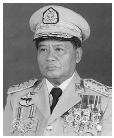MYANMAR
Than Shwe
Prime Minister

(pronounced "THAN sh-WEE")
"National unity has been fostered."
The Union of Myanmar (Burma) is the largest country on the Southeast Asian mainland, covering 678,500 sq km (261,970 sq mi). It shares borders with Bangladesh and India to the west, China to the north, and Laos and Thailand to the east. Its southern boundary is a coastline extending along the Andaman Sea and the Bay of Bengal. The capital is Yangon. The population, estimated at 42,510,537 in 2003, is ethnically diverse: 68% are ethnic Burmans, but other important groups include Indian, Pakistani, and Bangladeshi; Chinese (3%); Karens (7%); Shans (9%); Rakhine (4%); and Chins, Kachins, and Mons (together 2%). Although the different groups speak a variety of languages and dialects, the official language is Burmese. English has been the most common second language. An estimated 89% of the population adheres to some form of Buddhism. There are also Christians, Muslims, Hindus, and animists among the population.
The economy, heavily dependent on agriculture and the export of raw materials, is in shambles, with no recovery in sight. Factories are estimated to be operating at 10% capacity. Inflation was estimated at 20% annually in 2001. The government has tried to stabilize the value of the kyat, the national currency, against the dollar, but this attempt has been largely unsuccessful due to the interference of the black market. The black market rate much more accurately reflects the kyat' s real value than the rate that has been set by the government. Per capita gross domestic product (GDP) was US $1,500 annually in 2001. Primary exports include rice, teak, rubber, and cotton. The illegal economy is powerful, with illicit narcotics, mainly heroin and methamphetamines, produced and exported on a large scale.
ADDRESS
Office of the Prime Minister
Yangon, Myanmar
Comment about this article, ask questions, or add new information about this topic: